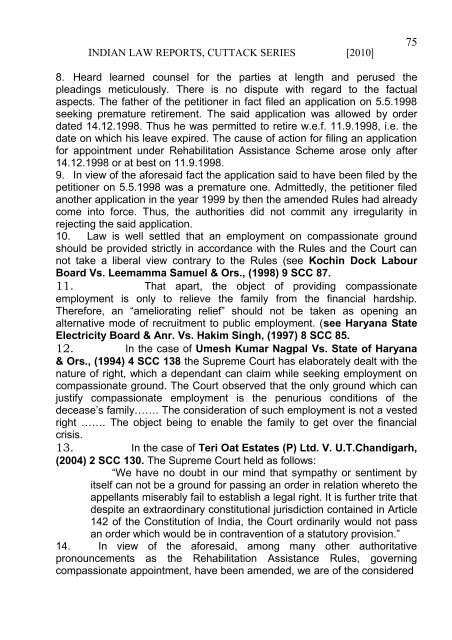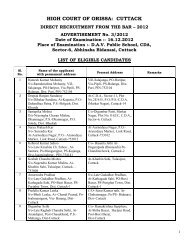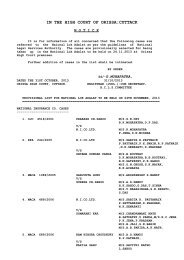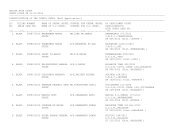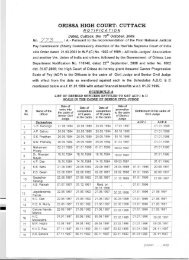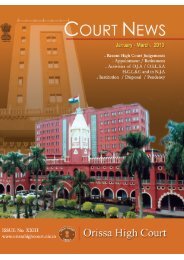ORIGINAL JURISDICTION - Orissa High Court
ORIGINAL JURISDICTION - Orissa High Court
ORIGINAL JURISDICTION - Orissa High Court
You also want an ePaper? Increase the reach of your titles
YUMPU automatically turns print PDFs into web optimized ePapers that Google loves.
INDIAN LAW REPORTS, CUTTACK SERIES [2010]<br />
8. Heard learned counsel for the parties at length and perused the<br />
pleadings meticulously. There is no dispute with regard to the factual<br />
aspects. The father of the petitioner in fact filed an application on 5.5.1998<br />
seeking premature retirement. The said application was allowed by order<br />
dated 14.12.1998. Thus he was permitted to retire w.e.f. 11.9.1998, i.e. the<br />
date on which his leave expired. The cause of action for filing an application<br />
for appointment under Rehabilitation Assistance Scheme arose only after<br />
14.12.1998 or at best on 11.9.1998.<br />
9. In view of the aforesaid fact the application said to have been filed by the<br />
petitioner on 5.5.1998 was a premature one. Admittedly, the petitioner filed<br />
another application in the year 1999 by then the amended Rules had already<br />
come into force. Thus, the authorities did not commit any irregularity in<br />
rejecting the said application.<br />
10. Law is well settled that an employment on compassionate ground<br />
should be provided strictly in accordance with the Rules and the <strong>Court</strong> can<br />
not take a liberal view contrary to the Rules (see Kochin Dock Labour<br />
Board Vs. Leemamma Samuel & Ors., (1998) 9 SCC 87.<br />
11. That apart, the object of providing compassionate<br />
employment is only to relieve the family from the financial hardship.<br />
Therefore, an “ameliorating relief” should not be taken as opening an<br />
alternative mode of recruitment to public employment. (see Haryana State<br />
Electricity Board & Anr. Vs. Hakim Singh, (1997) 8 SCC 85.<br />
12. In the case of Umesh Kumar Nagpal Vs. State of Haryana<br />
& Ors., (1994) 4 SCC 138 the Supreme <strong>Court</strong> has elaborately dealt with the<br />
nature of right, which a dependant can claim while seeking employment on<br />
compassionate ground. The <strong>Court</strong> observed that the only ground which can<br />
justify compassionate employment is the penurious conditions of the<br />
decease’s family……. The consideration of such employment is not a vested<br />
right ……. The object being to enable the family to get over the financial<br />
crisis.<br />
13. In the case of Teri Oat Estates (P) Ltd. V. U.T.Chandigarh,<br />
(2004) 2 SCC 130. The Supreme <strong>Court</strong> held as follows:<br />
“We have no doubt in our mind that sympathy or sentiment by<br />
itself can not be a ground for passing an order in relation whereto the<br />
appellants miserably fail to establish a legal right. It is further trite that<br />
despite an extraordinary constitutional jurisdiction contained in Article<br />
142 of the Constitution of India, the <strong>Court</strong> ordinarily would not pass<br />
an order which would be in contravention of a statutory provision.”<br />
14. In view of the aforesaid, among many other authoritative<br />
pronouncements as the Rehabilitation Assistance Rules, governing<br />
compassionate appointment, have been amended, we are of the considered<br />
75


